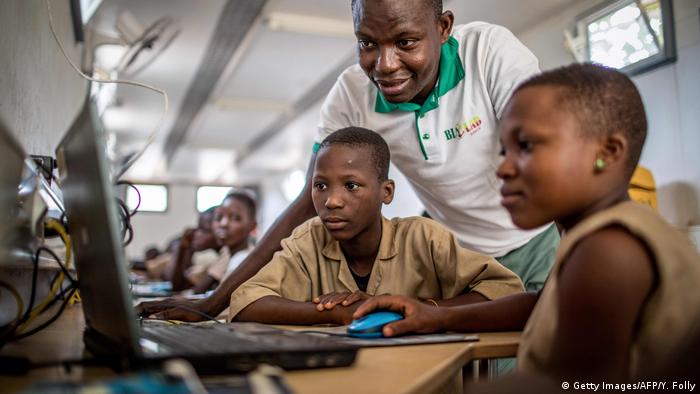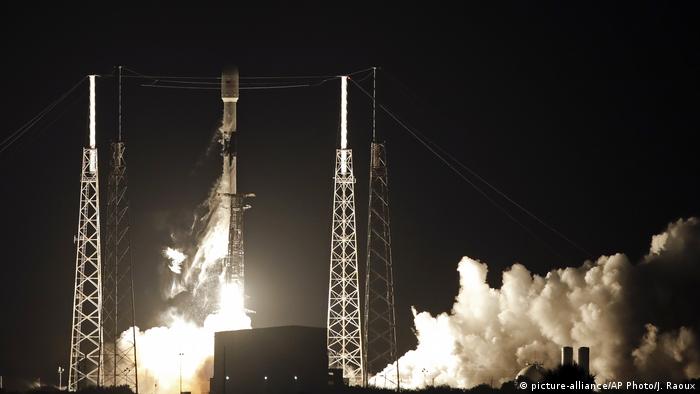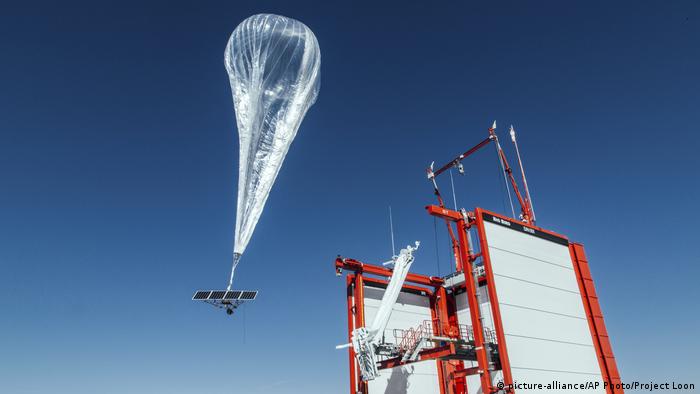American Tech companies and China are currently in a race with the Expansion of digital infrastructure in Africa. For the continent of opportunity and risk at the same time.

It should now have talked around: African countries are the world leaders when it comes to the use of mobile services such as E-Government or Mobile Money. The digital Revolution could be in Africa much more, were it not for the still glaring lack of reliable infrastructure on the continent. However, that is changing.
Especially the U.S. Tech giants Facebook, Amazon and Google entering the market: they invest in satellites, helium balloons or drones, which are also the most remote corners of the continent to the Internet are to be connected. As much media attention also gets the Chinese project of the “Digital silk road”. Behind it is a investment’s program for the Expansion of digital infrastructure in developing countries, with China especially in technology of the Huawei group to Africa to bring.
“Internet desert” in Parts of Africa
The projects from the United States and China currently fall on fertile ground. Because in spite of the digital achievements in Africa of the investment is not high, the market is tapped for a long time. According to a recent study by the world Bank, which is based on a series of surveys from the past few years, it uses just one out of five people in Sub-Saharan Africa the Internet. The continent is still far below the global average, which currently stands at just over 50 percent.

Despite great progress, many African countries are lagging behind in Internet access
However, these Figures conceal large regional differences within Africa. “Some countries, such as Liberia, Kenya and the Maghreb countries to reach 80 percent of the people. Other countries, however, are regular Internet deserts,” says Félix Blanc of the organization “Internet sans frontières (Internet without borders”). The Central African Republic, for example, is far from all coasts, and have thus no connection to the powerful submarine cable, which will allow access to international hubs.
Share of state-owned telecommunications company back
The major players in the African Internet infrastructure are the classic, multi-national Telecom giants like MTN, based in South Africa, the French Orange S. A., and Bharti Airtel from India. State-owned enterprises now play only a minor role. Almost half of all African Service Provider were in the year 2000, still in the hands of the state, there are currently only around a fifth. That is largely down to the increased cost, says Tina Freyburg: “Many States can not afford this alone and therefore depend on the investment of foreign companies,” says the political scientist. And then is interesting: “the one Who comes in the market? Who is there?”
For the governments this is a Dilemma. Because, especially for authoritarian regimes, control of the digital Infrastructure of Central power factor. Especially in the environment of elections and demonstrations, African governments have made it difficult in the past, the access to individual Apps such as Twitter and Facebook, or the Internet turned off completely.
This instrument of power to the Regime and exert pressure on the Service Provider. And are usually willing to cooperate. Félix Blanc of the “Internet sans frontières” reported that even a European company like Orange would accept censorship in order to tap into new markets. Economic agents would then be accomplices to, if governments threaten to deprive them of licenses.

With a Falcon 9 rocket, SpaceX brought last week for the first 60 Starlink-satellite in the orbit
The first 60 satellites are in space
However, there is resistance – and the surprising side gets upset. Because of the censorship and Shutdowns not only the users are affected. Also providers of popular Internet services and Apps, such as Facebook, Google, and Amazon are so far from the existing infrastructure. “And if now, for example, in Uganda, a company like MTN would get involved in a Shutdown, then Facebook is off, of course,” explains Tina Freyburg. Independence of the Telecom firms, and thus also of the censorship of authoritarian regimes, is one of the reasons why the Tech-giants quest to the infrastructure market.
The consultant and Internet activist Steve Song, is convinced that Africa is catapulted thanks to the investment from the United States at the forefront of technological development. He should know: Since 2014, a Song written annually, a report on the current situation of the Internet infrastructure on the continent. Hope projects such as Starlink, that is driven by the Elon Musks space company SpaceX prepare him. Using a new Generation of satellites orbiting the Globe in a very low orbit, and from there access to the Internet to deploy to remote areas to be supplied. The first 60 of a planned capacity of 12,000 satellites on 24. May All have been shot at a height of 450 kilometres.
A new, more equitable Internet model
Similar projects are also pursuing Amazon, Facebook and Google. However, not all projects made in the last few years, headlines have brought the desired success. Such as Facebook and Google from their investments in Internet-are drones being lost, reported to the Song. How the Loon project, which has launched the Google parent company, Alphabet, in partnership with Telkom Kenya, developed, is not yet foreseeable. Here is experimenting with solar-powered helium balloons. Nevertheless, the Song is for sure: If only one of these projects was successful, it would be a quantum leap for Internet access in rural areas.

Internet access via helium balloons – in Puerto Rico the “Project Loon works” already
However, the investments from the Silicon Valley in African Digital be-the infrastructure is also not quite straightforward, says Tina Freytag. If companies that make their business with advertising and content, could in the future rely on its own infrastructure, lead to a shift. “The architecture is mixed. This can have consequences whose long-term effects we can’t foresee, nor necessarily,” says Freytag.
This assessment is also shared by Félix Blanc, and refers in this respect to the Chinese Engagement on the continent: “This fragmentation and this war, which is observed at the global level between the two giants, China and the United States, will have a direct impact on the Africans.” Nevertheless, he believes that the shortfall of Africa can be in terms of infrastructure, a great opportunity. Africa have now the unique opportunity to develop a different, a distributed Internet model – one that is not magnetized by a few economic actors Monopoli.